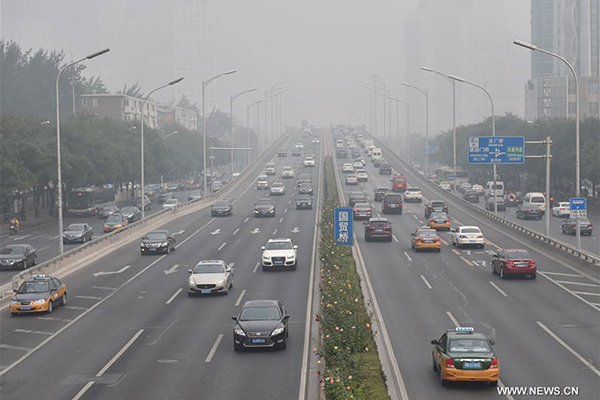Govt must try harder to erase black mark of smog
 |
|
Vehicles run on a smog-shrouded road in Beijing, capital of China, Oct 14, 2016. [Photo/Xinhua] |
More heavy smog is forecast to hit North China in the coming days, not long after it was previously blanketed by severe air pollution. It underlines the government still has to solve this seemingly intractable environmental problem.
There are few issues that do more disservice to the credibility of the governance capability of the authorities than the failure to protect residents from exposure to polluted air, given the smog's severe consequences, both medically and socially.
Air pollution has been blamed for the sharp rise in lung cancer cases in China, by five times over the past 30 years, which has made it the top killer among all cancers in the country.
And a 2013 study by scientists from China, Israel and the United States found that the smog cut life expectancy for Chinese residents living in the heavily polluted north by five and a half years.
Admittedly, some headway has been made since the government rolled out an action plan on air pollution control that year. Beijing has seen the amount of burned coal reduced by nearly half since then, and the number of blue sky days in many places in the north is reported to have increased steadily over the past several years.
But a lot more needs to be and can be done by the government, starting with closing the loopholes in environmental law enforcement.
Without national standards to phase out polluting vehicles, a significant source of air pollutants, efforts to control car emissions by cities such as Beijing, no matter how strict, will continue to be compromised by vehicles, especially heavy-duty ones, from elsewhere.
And if the fines imposed on enterprises for not using treatment facilities continue to be lower than the cost of using them, it is unrealistic to expect those enterprises to abide by the emission standards of their own volition.
And without an environmental accountability system that really bites, local officials will remain reluctant to shut down polluting enterprises that are major job creators or big payers into the local tax coffers.
Data show that environmental damage caused by pollution already accounts for 10 percent of China's gross domestic product. Economic prosperity at the cost of people's health and quality of life is unsustainable and runs counter to the pursuit of the Chinese dream of national rejuvenation.
All this requires a strategy in which governments at local levels coordinate their efforts in the fight against pollution, as well as a new way of perceiving development by officials.
- Smog-clearing tower just eyewash
- Smog envelopes capital of China
- Heavy pollution, smog shroud northern areas
- Beijing smog to peak on Friday, then fade
- Cold snap disperses smog in Beijing
- Golden Week revelers face third-highest smog alert
- Smog hits Northern China
- Beijing plans to list smog as a meteorological disaster

























